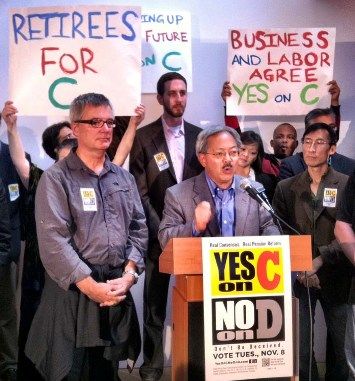Ruling on pension bonuses shows obstacles to CA reform
by Chris Reed | May 2, 2015 5:00 am
 [1]Providing bonus checks to government retirees when pension funds have good years has long been common and controversial around California. Now an appellate court has ruled this policy is a vested benefit that can’t be ended by formal action of government officials or as part of a voter-approved pension reform measure.
[1]Providing bonus checks to government retirees when pension funds have good years has long been common and controversial around California. Now an appellate court has ruled this policy is a vested benefit that can’t be ended by formal action of government officials or as part of a voter-approved pension reform measure.
It’s another sign of how daunting pension reform is in California. Ed Mendel of Calpensions.com has the details[2]:
A retiree group won a big victory last month. Reversing a superior court ruling, an appeals court overturned part of a voter-approved San Francisco pension reform in 2011 that ended higher payments to retirees when investments have “excess earnings.” …
Retirees, scattered and no longer union members, might seem unlikely to be formidable, particularly when battling a cost-cutting pension reform backed by all 11 county supervisors, business and labor groups, and 69 percent of San Francisco voters in 2011.
The reform, Proposition C, was the milder establishment alternative to deeper pension cuts in Proposition D by Jeff Adachi, one of the 16 candidates for mayor on the San Francisco ballot that year, including the incumbent and winner, Mayor Ed Lee.
“The epitome of greed,” Gary Delagnes, president of the San Francisco Police Officers Association, told SF Weekly[3] in 2012 when the retiree group began its legal challenge.
“Vested benefits” theory protects flawed concept
The court decision shows that judges take the concept of “vested benefits” very seriously. Unlike in the private sector, once a government union is promised benefits, those benefits can’t later be reduced. When this legal axiom is combined with the state Public Employment Relations Board’s hostility[4] to ballot measures on pension issues, the difficulty that taxpayers face in trying to scale back government pensions looks extraordinary.
But the San Francisco case is particularly noteworthy because it involves the single category of pension benefit that actuaries, accountants and good-government advocates find most indefensible. Giving government pensioners extra money when pension funds have strong years only makes mathematical sense if the pensioners get less when pension funds have bad years. No local government in California has such a policy.
“Excess earnings” benefits are never seen at big pension agencies with strong staffs like CalSTRS or CalPERS; it’s understood that they’re just not sustainable in the long run.
But in cities like San Francisco, San Diego and Fresno, and counties[5] like Alameda and Mendocino, the actuarial, common-sense arguments were overwhelmed by political clout and expedience.
Here’s a link[6] to a study commissioned by the Schwarzenegger administration that outlined the many costly quirks in local governments’ pension policies. It was highly critical of “excess earnings” bonuses.
- [Image]: https://calwatchdog.com/wp-content/uploads/2015/04/prop.c.2011.jpg
- details: http://calpensions.com/2015/04/27/retirees-get-voter-oked-pension-cut-overturned/#comments
- told SF Weekly: http://www.sfweekly.com/sanfrancisco/old-cop-young-cop-police-battle-retirees-over-pensions/Content?oid=2185398
- hostility: http://www.contracostatimes.com/breaking-news/ci_22772895/state-agency-issues-complaints-against-san-jose-over?source=rss
- counties: http://calpensions.com/2014/05/12/county-pension-funds-can-still-tap-excess-earnings/
- link: http://www.pebc.ca.gov/images/files/final/080107_PEBCReport2007.pdf
Source URL: https://calwatchdog.com/2015/05/02/ruling-pension-bonuses-shows-obstacles-ca-reform/